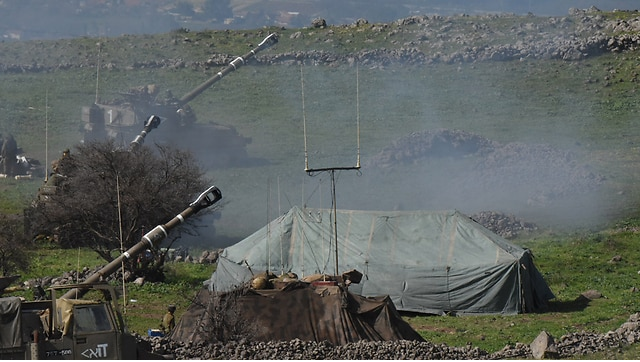The Mossad should be applauded for its intelligence achievement. Prime Minister Benjamin Netanyahu should be applauded for his presentation. While we Israelis weren’t exactly surprised to hear that the Iranians had lied, the findings play a significant part in the propaganda war waged by the Israeli government.
We’re not the only ones. The Obama administration, as well as the leaders of Europe, Russia and China, assumed the Iranians were lying when they said their nuclear project was of a peaceful nature. If they didn’t know what the Iranians were really building in the Fordow nuclear facility, they wouldn’t have gone to so much trouble to reach an agreement.
Will you offer us a hand? Every gift, regardless of size, fuels our future.
Your critical contribution enables us to maintain our independence from shareholders or wealthy owners, allowing us to keep up reporting without bias. It means we can continue to make Jewish Business News available to everyone.
You can support us for as little as $1 via PayPal at office@jewishbusinessnews.com.
Thank you.
The world powers chose to pretend they believe Iranian Foreign Minister Mohammad Javad Zarif’s lies. They examined the alternatives and reached the conclusion the agreement is the lesser of two evils.
The French president and the German chancellor visited the White House last week for an urgent round of talks with the US president. Emmanuel Macron, Angela Merkel and Donald Trump knew what Israel had gleaned from the Iranian archive. Nevertheless, each side stuck to its stance—the Europeans in favor of the agreement, Trump against the agreement. By May 12, Trump will likely order a US withdrawal from the agreement. What happens the day after depends mainly on the Iranians.
Israeli Mossad has obtained ‘secret files’ showing Tehran still trying to develop weapons
When Netanyahu completed his beautiful presentation in English, including the props, and when he finished summarizing it in Hebrew, I expected him to turn to his voters—the citizens of the State of Israel—and share his plans with them. Is he pursuing a war with Iran? If he is, Israelis are entitled to know about it before purchasing all-inclusive packages for a summer vacation in Turkey.
The World Cup is about to kick off in a month and a half from now, this time in Russia. Israel didn’t qualify for the games, but it has its own way of participating in them. Both in 1982 and in 2006, Israel got involved in a war during the World Cup. It’s quite possible we are headed to a third war.
Two Syrian army bases, which are used by Iranian forces as well, were attacked from the air Sunday night. One near the city of Aleppo, the other near Hama. Like in the previous strike, at the T-4 airbase in northern Syria, there were reports of Iranian casualties.
While official Israel didn’t take responsibility for the attack, an anonymous source went to the trouble of telling the New York Times that 200 long-range Iranian missiles had been destroyed in the strike. If it’s true, we should be happy: We would rather see Iranian missiles exploding in Syria than on Israeli territory. But the question remains: Is Israel pursuing a war with Iran?
The strike was followed by public threats from Netanyahu and Defense Minister Avigdor Lieberman: Israel won’t let Iran establish military presence in Syria. If Tel Aviv is attacked, Tehran will be attacked.
The rhetoric left no room for doubt: Israel is stepping up its demands from Iran. At first, the red line was shipments of advanced weapons to Hezbollah in Lebanon. Then, the red line turned geographical: Israel won’t allow the Iranian-backed militias to approach the Israeli border. The wording of the threats and the attacks on Iranian facilities located hundreds of kilometers from the Golan Heights border point to a change in policy: Israel considers any Iranian military presence in Syria a red line.
There is absolutely no chance Iran will take the hint and pull its forces out of Syria. There is absolutely no chance Iran will apologize for its past lies and give up its nuclear project altogether. These are unachievable goals. So we must once again inquire about the meaning of these initiated provocations: Is Israel pursuing a war with Iran?
Let there be no misunderstanding: Iranian military presence in a country bordering Israel is major trouble. It calls for Israeli action in every possible way—diplomatically, covertly and militarily—as long as we know what we want to achieve, how to achieve it and at what cost.
Any price, Lieberman says in his speeches. In a war on Iran, he is willing to pay any price. Before we chant “go Lieberman” and “let’s go to Tehran,” we should remember what we’re talking about: Iran—through Hezbollah, the Assad army and the militias it operates—is capable of launching tens of thousands of missiles at the Israeli home front from Lebanon and Syria. While Israel has the military ability to deal with this threat, its solutions are partial. The price we stand to pay in deaths, property damage and a paralyzed economy for many weeks will be heavy, possibly heavier than in previous wars. The price that would be paid by civilians on the other side will be even heavier. Will Iran disappear? That’s very unlikely.
Israel would like to control the process, to manage the conflict with the Iranians the way it decides. Unfortunately, neither player can control these types of conflicts. An overly accurate shell could send the sides into an all-out war. We all remember Hezbollah leader Hassan Nasrallah’s words of regret over the kidnapping of two Israeli soldiers that led to the Second Lebanon War. We all remember the artillery shell that hit Kafr Qana in 1996, immediately eliminating the achievements of Operation Grapes of Wrath.
Here’s another example: Senior Hezbollah commander Jihad Mughniyeh was assassinated in Syria in December 2014, along with four or five other Hezbollah officers. The organization retaliated by firing seven Kornet missiles at a Givati convoy, killing two soldiers: Captain Yohai Kalangel and Sergeant Dor Nini. The IDF contained the event. Had 10 soldiers been killed, Israel would have had no other choice but to launch a third war in Lebanon.
Sometimes, war is inevitable. Sometimes, in the event of an existential threat, there’s no escape from initiating a war. But one of the lessons we have learned from the wars of the past is that playing with fire is dangerous. Anyone who decides to provoke the other side should first of all make the risks, the intention, the goal and the price clear to our side, to the Israeli public.
The situation we are currently facing is somewhat similar to the Zafit Stream disaster. The Israelis are entering the stream with a sense of confidence. They’re certain that everything will be okay. Someone at the top examined the risks and promised them that they will suffer no harm. And then comes the flood.






